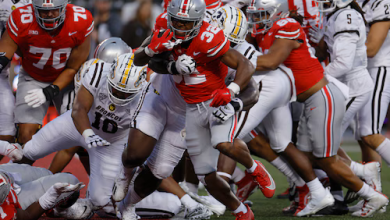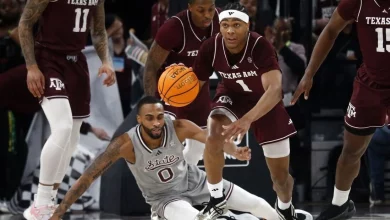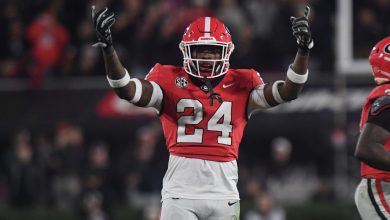Bills QB Josh Allen believes the tush push shouldn’t be banned, despite Bills ownership voting for a ban; he sees strategic value and effectiveness in the play.

In recent NFL seasons, one of the most talked-about plays has been the so-called “tush push,” a quarterback sneak combined with offensive linemen pushing from behind to gain crucial yards in short-yardage situations. The play has gained notoriety because of its effectiveness, with teams like the Philadelphia Eagles using it frequently to convert on third-and-short or fourth-and-inches, often with remarkable success.
Despite its effectiveness, the play has sparked controversy within the league, with some viewing it as a strategic innovation, while others see it as an unfair or potentially dangerous tactic. The NFL’s Competition Committee has debated whether to ban or regulate the play, with some teams advocating for restrictions and others defending its strategic importance.
In this context, Bills quarterback Josh Allen has publicly expressed his thoughts on the tush push, offering insights into why he believes it should not be banned, even as some teams, including the Bills, have voted in favor of a ban.
The Origins and Mechanics of the Tush Push
What is the Tush Push?
The tush push, also known as the quarterback sneak or the “Brotherly Shove” (popularized by the Eagles), involves the quarterback lining up directly behind the center and receiving the snap, then being propelled forward by the offensive line—often with players pushing from behind—to gain a yard or two. The play relies on collective effort, leverage, and the quarterback’s core strength.
Why is it so effective?
- Physical Advantage: The offensive line’s push creates a massive power advantage, often allowing the ball carrier to surmount the defensive line with minimal effort.
- Timing and Simplicity: The play is quick, reducing the chance of defensive disruption or turnovers.
- Predictability: Defenses often anticipate the play in short-yardage situations, making it easier for offensive lines to execute.
Historical Context
While quarterback sneaks have been a staple in football for decades, the recent surge in the tush push’s popularity is due to teams like the Eagles perfecting it as a near-automatic conversion on critical downs. Its success rate has improved, and teams have increasingly relied on it as a strategic weapon.
NFL’s Debate: To Ban or Not to Ban?
The League’s Position
The NFL’s Competition Committee has periodically discussed whether to restrict or ban the play, primarily citing concerns over player safety and fairness. The play’s high success rate, combined with its physical nature, raises safety questions, especially regarding the pushing players’ potential for injury.
The Votes and League Dynamics
In the 2023 offseason, 22 NFL teams, including the Bills, voted on a proposal to ban the tush push. The vote favored banning or restricting the play, reflecting a league-wide concern about its legality and safety. However, opinions vary among teams, coaches, players, and analysts.
The Arguments For Banning
- Player Safety: The play involves significant physical pushing, which can lead to injuries, especially for the quarterback and offensive linemen.
- Fairness and Innovation: Critics argue that the play exploits rules and physical advantages in ways that undermine the game’s competitive balance.
- Rule Consistency: Some believe the play pushes the boundaries of what is considered legal in terms of pushing and blocking techniques.
The Arguments Against Banning
- Strategic Element: Teams have devised and perfected the play, making it an integral part of modern football strategy.
- Player Agency: Offensive linemen and the quarterback are executing a play within the rules, and banning it could be seen as restricting player agency.
- Game Integrity: Banning such a successful tactic could diminish the strategic diversity of the game.
Josh Allen’s Perspective: Why the Bills QB Opposes a Ban
Allen’s Public Comments
Josh Allen, the Bills’ star quarterback, has publicly expressed his opinion that the tush push should not be banned. Despite the Bills’ ownership voting in favor of restrictions, Allen has voiced a nuanced view emphasizing strategic value and respecting the play’s effectiveness.
Allen’s Reasoning
- Strategic Value: Allen recognizes that the play is a legitimate, well-executed strategy that teams have developed to convert short-yardage situations reliably. He argues that banning it would limit tactical options and undermine the competitive depth of the game.
- Effectiveness and Simplicity: Allen points out that the play is simple and effective, often allowing teams to convert in critical moments, which can be decisive in winning games.
- Respecting the Rules: As a player who operates within the framework of NFL rules, Allen contends that if the play is legal, it should be part of the game. He believes banning it would be an overreach and that teams should adapt to or defend against it rather than have it eliminated.
- Player Safety Concerns Are Manageable: While acknowledging safety concerns, Allen suggests that proper technique, rules enforcement, and safety protocols can mitigate injury risks without outright banning the play.
The Broader Message
Allen’s stance underscores a broader philosophy: that football is a physical game that evolves through strategic innovations, and restricting effective plays can stifle creativity and competitiveness. He emphasizes that the game should preserve its strategic diversity, allowing teams to utilize all legal tactics to succeed.
The Impact of the Tush Push on the NFL Landscape
Teams’ Reliance on the Play
The Eagles, among others, have demonstrated how powerful and reliable the tush push can be, especially in close games or playoff scenarios. Its success rate can approach or exceed 90%, making it a go-to play in crucial situations.
The Potential Consequences of a Ban
- Strategic Shift: Teams would need to develop alternative short-yardage plays, potentially less effective or more risky.
- Gameplay Dynamics: Banning the play could alter offensive strategies, making short-yardage situations more unpredictable and possibly more dangerous.
- Player Safety: While safety concerns are valid, some argue that the play’s physical nature is inherent to football, and stricter enforcement of existing rules could address safety without banning.
The Cultural and Ethical Debate
The debate about banning the tush push touches on broader themes in sports: fairness, safety, innovation, and the spirit of competition. Some view the play as a clever, aggressive tactic that exemplifies football’s physicality, while others see it as pushing the boundaries of fair play.
The Broader NFL Context: Rules, Innovation, and Future Directions
Evolving Rules and Player Safety
The NFL continually updates rules to improve safety, often banning or restricting certain techniques—like helmet-to-helmet contact or excessive force. The tush push presents a new challenge, balancing innovation with safety.
The Role of Technology and Analytics
Teams now rely on advanced analytics to determine the success rates of plays like the tush push. Data supports its high efficiency, giving teams leverage in advocating for or against bans.
Legal and Ethical Considerations
Banning a play that is within the rules raises questions about the integrity of the game and the league’s role in regulating strategy. The league must weigh the benefits of innovation against safety and fairness.
The Future of the Tush Push in the NFL
Potential Outcomes
- Legislation: The NFL could implement restrictions, such as limiting the number of pushers or enforcing stricter techniques.
- Acceptance: The league might choose to accept the play, emphasizing safety protocols and fair play.
- Evolution of the Play: Teams may innovate new versions or variations that circumvent proposed restrictions.
Impact on Players and Teams
Players like Josh Allen and teams across the league will continue to adapt, balancing offensive ingenuity with safety concerns. The debate highlights the ongoing evolution of football tactics and rules.
Respecting the Spirit and Strategy of Football
Josh Allen’s stance that the tush push should not be banned reflects a broader appreciation for the strategic depth and physical challenge that make football a compelling sport. While safety concerns are legitimate, Allen emphasizes that the play, when executed within the rules, is a legitimate, effective tactic that adds excitement and unpredictability to the game.
The NFL faces a complex decision: protect player safety without stifling innovation or undermining the competitive spirit. As the league deliberates, players like Allen serve as voices of reason, advocating for a game that remains both safe and strategically rich.









